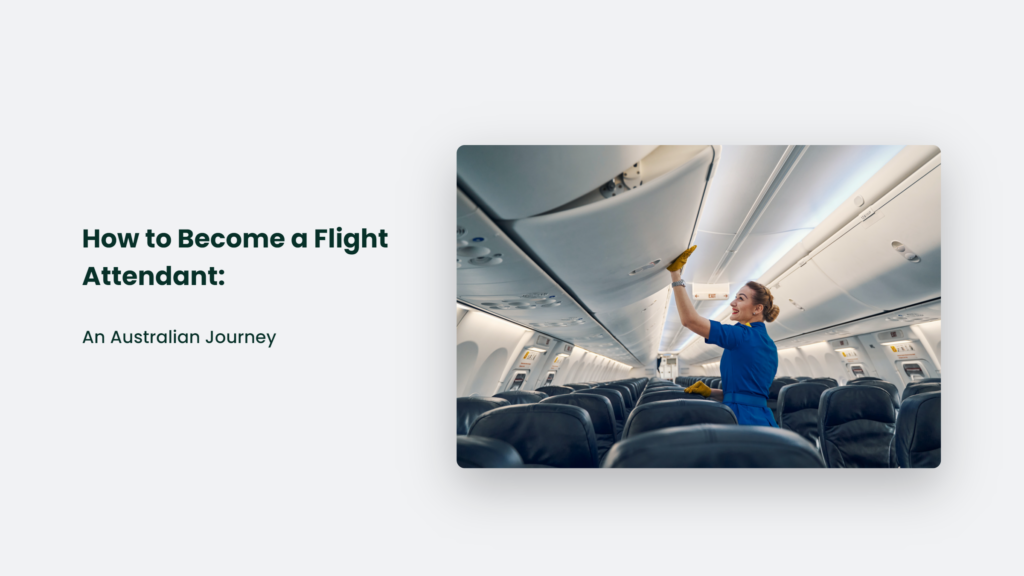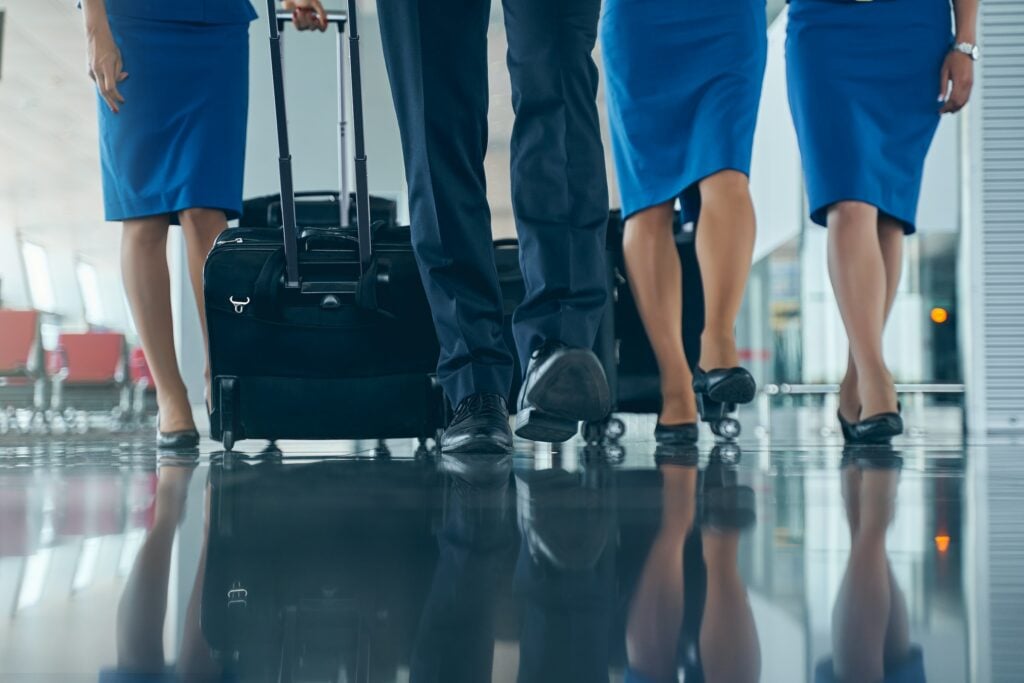Have you ever dreamed of soaring through the skies, meeting diverse people, and experiencing the dynamic life of a flight attendant? In Australia, becoming a flight attendant is not just a career change; it’s a lifestyle transformation. Let’s embark on this high-flying adventure together and understand how to become a flight attendant Down Under.

The Essentials for Takeoff: Key Requirements for Becoming a Flight Attendant in Australia
Educational Qualifications:
- Senior Secondary Certificate of Education: Most airlines require at least a high school level education, typically the Senior Secondary Certificate of Education or equivalent. It forms the basic educational groundwork for the role.
- Additional Training or Certification: While not always mandatory, having additional qualifications in hospitality, customer service, or first aid can be beneficial.
Physical and Health Requirements:
- Height and Reach: Airlines often have specific height requirements, ensuring flight attendants can reach overhead bins and perform safety functions effectively.
- Physical Fitness: The role can be physically demanding, requiring good overall health and fitness. It includes standing for long periods and handling luggage or emergency equipment.
- Medical Clearance: A medical examination is typically required to confirm that you are fit for the demands of flying, including coping with varying air pressures and the job’s physical demands.
Customer Service Experience:
- Relevance and Impact: Previous experience in customer service, especially in hospitality, travel, or retail, is highly valued. This experience demonstrates your ability to handle diverse customer needs and provide excellent service.
- Skills Development: Working in customer service develops essential skills such as communication, problem-solving, and patience, which are crucial in the role of a flight attendant.
Personal Attributes and Skills:
- Communication Skills: Excellent verbal and written communication skills are vital. You’ll need to interact effectively with passengers and crew, often in challenging situations.
- Interpersonal Skills: Being personable, empathetic, and able to build rapport quickly with strangers is key. It helps create a pleasant and safe environment for passengers.
- Multitasking and Adaptability: The ability to handle multiple tasks simultaneously and adapt to changing situations is essential in the dynamic environment of an aircraft.
Language Proficiency:
- English Proficiency: Proficiency in English is a must, as it’s the standard language used in international aviation. Additional language skills can be an advantage in serving a diverse passenger base.
Legal Requirements:
- Age Requirement: You must be at least 18 to work as a flight attendant in Australia.
- Work Authorization: Australian citizenship or the legal right to work in Australia is necessary.
- Background Checks: Airlines conduct thorough background checks, including criminal history and previous employment verification.
Professional Presentation:
- Grooming Standards: Airlines have specific grooming and presentation standards. It includes a neat and professional appearance, wearing uniform guidelines, and maintaining good personal hygiene.
How to Become a Flight Attendant: In-Depth Steps to Becoming a Flight Attendant in Australia
Embarking on the career path of a flight attendant in Australia is an exciting and multifaceted process. It requires a blend of preparation, skill development, and an understanding of the specific demands of the aviation industry. Let’s delve into each step to gain a comprehensive understanding of what it takes to join this dynamic and rewarding profession.
Begin Your Research:
- Understanding the Industry: Start by familiarizing yourself with the aviation industry, particularly the role of flight attendants. It involves understanding the duties, lifestyle, and expectations associated with the job.
- Exploring Job Opportunities: Visit the websites of Australian airlines such as Qantas, Jetstar, Virgin Australia, Rex Airlines, and others for career opportunities. Also, keep an eye on job portals like seek.com.au for the latest job listings in the airline sector.
Educational Requirements:
- Secondary Education: At a minimum, you should have your Senior Secondary Certificate of Education or equivalent. If you don’t have this qualification, consider acquiring it, as it is often a prerequisite.
- Customer Service Experience: While not always mandatory, having experience in customer service, hospitality, or similar fields can be a significant advantage.
Creating an Impressive Resume:
- Highlight Relevant Skills: Emphasize your experience in customer service, teamwork, and any other skills relevant to the role of a flight attendant.
- Professional Presentation: Include a professional headshot and a full-body photo. Ensure your resume is concise and communicates why you’re a strong candidate for the role.
Application Process:
- Filling Out Applications: Apply through the airlines’ websites or job portals. Tailor your application to each airline, highlighting your suitability for their specific culture and operational style.
- Cover Letter: Alongside your resume, craft a persuasive cover letter that expresses your enthusiasm for the role and how you can contribute positively to the airline’s team.
The Interview Process:
- Initial Screening: Often, the first round of interviews is conducted online. Dress professionally, even for video interviews, and prepare to discuss your qualifications and interest in the role.
- In-Person Interviews: Successful candidates are usually invited for in-person interviews. It is your opportunity to make a strong impression with your interpersonal skills and understanding of the airline’s values.
Training and Certification:
- Airline Training Programs: Once selected, you’ll undergo training specific to the airline. It often includes customer service training, safety procedures, emergency response training, and familiarization with aircraft types.
- Duration and Intensity: Training programs are typically intense and can last around six weeks. They are designed to prepare you for the practical realities of working as a flight attendant.
Final Steps and Job Offer:
- Evaluation: Throughout the training, your performance and adaptability are evaluated.
- Job Offer: Upon completing training, you will receive a job offer from the airline. It is the time to carefully review the terms and ensure they align with your career goals.
Continuous Learning and Adaptation:
- Ongoing Training: Even after securing a job, flight attendants often undergo periodic training to stay updated with safety protocols, customer service standards, and regulatory changes.
- Career Advancement: As you gain experience, there are opportunities for career advancement within the airline, such as becoming a senior flight attendant or moving into training or management roles.
The Role of a Flight Attendant: More Than Just a Job
Being a flight attendant in Australia means embracing flexibility and commitment. You must be adaptable, culturally sensitive, and trained in safety procedures and first aid. The job involves more than just serving passengers; it’s about creating an experience.
Expectations and Challenges
Shift work, medical emergencies, and extended shifts are part of the job. But so is meeting new people, visiting different places, and being part of a vibrant team. It’s a role filled with highs and lows, quite literally!
Frequently Asked Questions:
Do I need a specific qualification to become a flight attendant in Australia?
No formal qualification is required, but customer service experience and a Senior Secondary Certificate of Education or equivalent are crucial.
How long does the training last?
Training typically spans around six weeks, focusing on customer service and safety procedures.
What are the main challenges of being a flight attendant?
Shift work, dealing with emergencies, and the job’s physical demands are some of the challenges flight attendants face.
The Bottom Line:
In conclusion, becoming a flight attendant in Australia is more than just a job; it’s a gateway to a world of adventure and unique experiences. It demands dedication, flexibility, and a passion for service. If this sounds like the journey for you, fasten your seatbelt, and let’s take off into a world of exciting opportunities!




